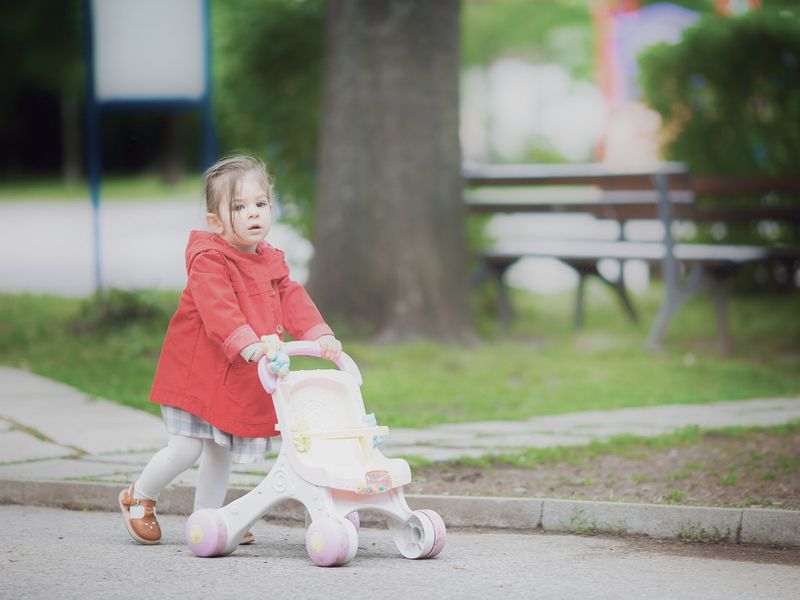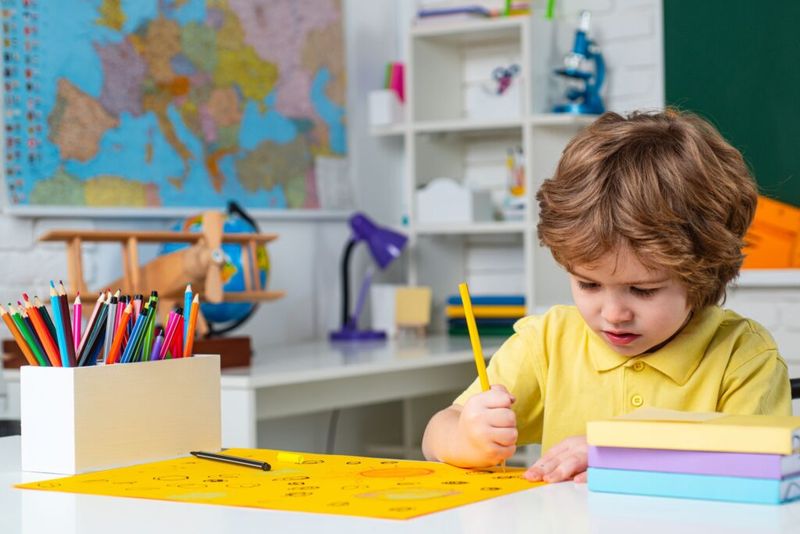Many parents strive to provide their children with the best opportunities, often without realizing that their well-intentioned actions may inadvertently apply excessive pressure. Recognizing the signs of pushing too hard can foster a healthier environment for growth and emotional well-being.
This thoughtful exploration of 17 subtle signs aims to shine a light on potential areas for reflection and adjustment. By understanding these red flags, parents can nurture their children’s development in a balanced manner, ensuring a supportive and loving home.
1. You correct everything they do—even when it’s harmless
Correction is part of teaching, but when overdone, it can dampen creativity. Picture a child drawing freely, only to have every stroke critiqued. This constant correction might suggest that perfection is the goal, overshadowing the joy of creation.
Children should be encouraged to experiment and learn from their mistakes, rather than fearing them. An environment where every action is scrutinized can lead to anxiety and fear of failure.
By allowing children to express themselves freely, parents can nurture a sense of accomplishment and individuality, fostering a love for learning.
2. They act perfect around you, but fall apart elsewhere
Children often wear a mask of perfection around parents to avoid disappointment. Envision a child sitting primly at the dinner table, hiding their struggles beneath a veneer of composure.
This facade can be a sign that they feel immense pressure to meet parental expectations. It’s crucial for parents to create a safe space where children feel comfortable expressing their true feelings.
Recognizing and addressing this can prevent emotional bottling, promoting open communication and emotional health. Encouraging honesty helps in building a trusting relationship between parents and children.
3. You use guilt instead of guidance
Guilt can be a powerful motivator, but it’s often more harmful than helpful. Consider a scenario where a parent expresses disappointment instead of providing constructive feedback.
Guilt-driven parenting may lead children to associate love with performance, causing stress and confusion. It’s important to guide children with empathy and understanding, rather than making them feel guilty for their mistakes.
By focusing on growth rather than guilt, parents can foster a supportive environment that encourages development and learning from errors, without damaging emotional well-being.
4. You can’t let them make small mistakes
Mistakes are vital learning tools. Picture a parent hovering over a child building a tower of blocks, intervening at every wobble.
This constant oversight can hinder a child’s ability to learn from their errors. By not allowing small mistakes, parents may inadvertently teach children to fear failure instead of seeing it as an opportunity for growth.
Promoting independence by allowing children to make and learn from minor mistakes builds resilience and problem-solving skills. It shows them that it’s okay to fail and try again.
5. Their achievements matter more than their effort
Quando achievements are celebrated more than effort, the message might be success over process. Imagine a child receiving praise only when holding a trophy, while their hard work goes unnoticed.
Focusing solely on outcomes can lead children to associate their worth with achievements rather than personal growth. It’s essential for parents to recognize and appreciate the effort and dedication behind success.
This approach nurtures a growth mindset, encouraging children to value learning and perseverance, rather than fearing failure or valuing only the end result.
6. You manage their friendships
Friendships are crucial for social development, yet some parents feel compelled to control these relationships. Visualize a parent orchestrating every playdate, leaving the child with little say.
This management may stem from good intentions, but it limits a child’s ability to develop social skills independently. Children need the freedom to choose and navigate friendships, learning valuable lessons about communication and empathy.
Encouraging children to manage their own social interactions fosters independence and confidence, enabling them to form genuine, lasting relationships.
7. They avoid telling you when they mess up
When children hide mistakes, it may signal fear of parental reaction. Picture a child concealing a broken toy, anxious about forthcoming judgment.
This behavior can arise from a fear of disappointing parents or facing harsh consequences. It’s vital for parents to cultivate an environment where honesty is valued over perfection.
By responding with understanding and support, parents can encourage open communication, allowing children to feel safe in confessing missteps and seeking guidance. This trust-building approach nurtures an atmosphere of acceptance and growth.
8. You ask about grades before asking how they’re doing
Prioritizing academic performance over emotional well-being sends a clear message to children. Imagine a parent whose first question is about grades rather than how their child is feeling.
This focus on performance can make children feel valued only for their achievements, neglecting their emotional needs. It’s essential for parents to balance interest in academic success with attention to their child’s mental and emotional health.
Creating a supportive environment starts with showing genuine interest in a child’s overall well-being, fostering a sense of balance and security.
9. You talk more than you listen
Effective communication is a two-way street, yet some parents dominate conversations. Visualize a parent doing all the talking while the child sits quietly, unheard.
This dynamic can lead children to feel undervalued, as if their thoughts and feelings don’t matter. By actively listening, parents demonstrate respect and validation, encouraging children to express themselves freely.
Engaging in genuine dialogue fosters trust and understanding, allowing for deeper connections and a more harmonious relationship. Children thrive when they know their voices are heard and respected.
10. They say “I’m fine” way too often
When “I’m fine” becomes a default response, it may suggest deeper issues. Picture a child saying “I’m fine” with a smile that doesn’t reach their eyes.
This phrase can be a shield, protecting them from probing questions or perceived parental disappointment. It’s important for parents to recognize this as a potential red flag and delve deeper when necessary.
By encouraging honest communication and showing genuine concern, parents can help children articulate their true feelings, fostering emotional intelligence and a deeper understanding of themselves.
11. You can’t handle their emotions without fixing them
Emotions can be uncomfortable, but fixing them isn’t always the solution. Imagine a parent swiftly addressing tears with tissues instead of empathy.
Children need to feel their emotions are valid and worthy of expression, not problems to be fixed. Quick fixes may teach them to suppress feelings rather than understanding them.
By allowing children to process emotions naturally, parents foster emotional resilience and self-awareness. Encouraging open expression helps children learn to navigate their emotional landscape with confidence and clarity.
12. You praise performance, not progress
Performance-based praise can overshadow the importance of progress. Envision a parent applauding a perfect test score without acknowledging the hours of study behind it.
This focus can lead children to equate their worth with achievements, ignoring the value of hard work and improvement. Parents should celebrate progress and effort, reinforcing a growth mindset.
By valuing the learning journey, they encourage resilience and determination, allowing children to appreciate their development rather than just the destination.
13. They’re scared of disappointing you
The fear of disappointment can weigh heavily on a child. Picture a child presenting a project, eyes filled with anxiety, focused on parental approval.
This fear often stems from high expectations and can stifle creativity and confidence. It’s important for parents to reassure children that their love is unconditional and not tied to success.
By fostering a supportive environment, children can explore new challenges without the burden of perfection, building self-assurance and a sense of security in their abilities.
14. You frame fun as a reward
When fun becomes a reward, it teaches children that enjoyment must be earned. Visualize a child diligently completing homework, motivated by the promise of playtime.
This mindset can diminish the intrinsic value of fun and relaxation, making them seem secondary to obligations. Parents should integrate leisure activities as essential parts of daily life, not just rewards.
By valuing play and creativity equally with responsibilities, children learn to appreciate balance and the importance of self-care. This approach nurtures well-rounded development.
15. You push your dreams over theirs
Parents may unknowingly impose their aspirations on children. Picture a parent urging a child into sports while the child dreams of music.
This dynamic can lead to resentment and a lack of personal fulfillment. Children need the space to pursue their own passions and interests, discovering their unique talents and desires.
By supporting their dreams, parents foster individuality and confidence. Encouraging children to follow their hearts builds a sense of autonomy and satisfaction in personal achievements.
16. They feel pressure to always be “on”
Constant pressure to perform can be overwhelming. Visualize a child surrounded by reminders of tasks, feeling the weight of constant expectations.
This pressure can lead to burnout, anxiety, and a fear of failure. It’s crucial for parents to recognize when their demands may be pushing children beyond healthy limits.
Encouraging downtime and relaxation helps children recharge, promoting a balanced lifestyle. Parents should model and support the importance of rest and self-care, fostering long-term well-being and happiness.
17. They seem relieved when you’re not around
When a child’s relief at a parent’s departure is palpable, it signals potential underlying tension. Imagine a child visibly relaxing as their parent exits the room.
This relief may indicate that the child feels freer and less judged without parental presence. It’s important for parents to create a home environment where children feel comfortable and accepted as they are.
By promoting an atmosphere of love and understanding, parents can help children feel at ease, whether in company or solitude, fostering a sense of security and belonging.


















